|
Friday, 17 March
|
|
European Initiatives on Water and Poverty
|

|
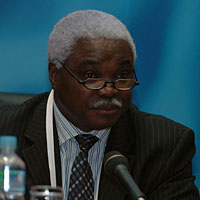
Jean-Pierre Mbassi, Secretary General of United Cities and Local
Governments of Africa, chaired the session. Noting the existence of
several decentralization initiatives, he lamented that many local
stakeholders remain outside participatory processes in water
initiatives.
|
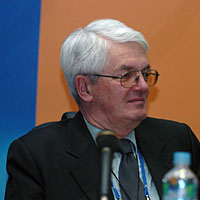
Wolfgang Stalzer, Austrian Ministry of Agriculture, Forestry,
Environment and Water Management, said that Austria is committed to the
EU Water Initiative and the EU's Africa, Caribbean and the Pacific
(EU-ACP) Water Facility. He underlined that the EU Water Facility could
become the "lighthouse" in international water financing.
|
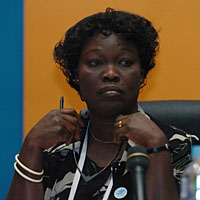
Evelyn Otim, National Water and Sewerage Corporation of Uganda,
addressed the funding gap between national- and community-level water
projects, underscoring the importance of women in these projects.
|
|
Regional Presentation: Americas
|

|

Benedito Braga, Vice-President of the World Water Council (WWC), opened
the Americas regional presentation.
|

Jorge Mora Portuguéz, Central American Network for Water Action,
elaborated on the region's preparatory process for the 4th Forum.
|

Abel Mamani, Bolivia's Minister of Water, expressed hope that water as a
human right will soon be recognized in Bolivia's constitution.
|

Addressing water management in the region, Abel Mejía, World Bank, said
modest breakthroughs have been achieved in the preservation and
management of water resources, although decreasing investment, increasing
competitiveness and other challenges persist.
|

Maureen Ballestero, Global Water Partnership (GWP) Central America,
presented the regional document for the Americas, noting the region's
high degree of water variability, predominately urban character,
vulnerability to natural disasters and hydropower potential.
|

Antonio Vives, Inter-American Development Bank (IDB), addressed the
challenges of financing water supply. Noting the need for supplies to
reach the lowest-income groups, he observed that the countries where
investment is most needed have the lowest level of tax collection
coupled with inefficient water supply and institutional management.
|
|
Keynote Speech by Prince Naruhito of Japan
|
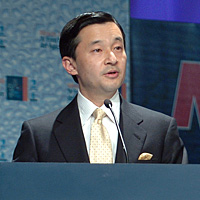
|
Crown Prince Naruhito of Japan gave a keynote address on Edo (currently
Tokyo) and water transport, drawing parallels between water
infrastructure development in England and Japan and how these
contributed to the Industrial Revolution in the case of England and to
the growth of Edo since the 17th Century. He outlined the development of
water engineering solutions and their use in modern water
infrastructure.
On the history of water management in Edo, he highlighted several water
management and infrastructure projects, including an eastward diversion
of the Tone River from Tokyo Bay into the Pacific Ocean, land
reclamation through drainage, and Japan's oldest Minuma-dai
irrigation canal.
In closing, he noted the special relationship between people and water
that has contributed to the creation of present-day Tokyo, and
encouraged participants to draw inspiration from pioneering water
management solutions throughout history as well as from local knowledge.
|
|
Keynote Speech on Water for Growth and Development
|
|
Introducing the theme "Water for growth and development," Luis
Alberto Moreno, IDB President, called for a systematic and continuous
approach to tackling water issues, especially through improving
sustainable funding for water infrastructure. He said that to achieve
the Millennium Development Goals (MDGs), investments are an urgent
priority. He said investments in sanitation activities are effective
tools for achieving the MDGs' water target, and opined that changes
in economical and political systems pose administrative and financial
challenges. He advocated: universal access to water, combined with the
promotion of efficient use; mechanisms to solve water-related conflicts;
efficient financial structures to ensure reasonable prices for local
communities; and subsidies to ensure maintenance of water infrastructure
to limit water waste. He also recommended: well-regulated private sector
involvement at micro- and macro-levels; incentives to promote efficient
financial administration; attracting new financial resources while
strengthening existing ones; and additional multilateral financial
programmes.
|

|
|
Dynamics of Water and Growth: Issues and Political Reflections
|

Chairing the session, Katherine Sierra, World Bank, emphasized that
Africa is a region for priority action.
|

David Grey, Senior Water Advisor, World Bank, introduced the framework
theme paper: "Water for Responsible Growth and Sustainable
Development," which examines the concept of a "minimum
platform," a threshold that countries must acquire to achieve water
security.
|

Mohamed El Yazghi, Morocco's Minister of Environment, described his
country's water management efforts, stressing the importance of
democratic institutions, respect for human rights, and participation of
local authorities in policy-making.
|

Suresh Prabhu, Member of Parliament, India, stressed the importance of
environmentally sustainable, socially desirable and politically viable
water policy-making. He said all people have the fundamental need for
clean air and water, and that policies must be mainstreamed and focus on
long-term water security.
|

Achim Steiner, Director General of The World Conservation Union (IUCN),
suggested that the water debate needs to be framed in terms of rights
and risks. He emphasized that all water management entails costs and
benefits and that good governance, multi-stakeholder scrutiny and
options assessment are required in decision-making processes.
|

Maria Mutagamba, Ugandan Minister of State for Water, said Africa is being
held hostage by its hydrology, which is preventing Africans from
improving their living conditions. She stressed the severity of
droughts, linked water and gender issues, and urged greater awareness
throughout the international community of the water crisis in Africa.
|
|
Indigenous Towns and Water
|

|

Xóchitl Galvez Ruiz, National Commission for the Development of
Indigenous Peoples of Mexico, emphasized the sanctity of water, urged
efficient mechanisms to stop the depletion of major sources of water,
and stressed the need for local communities to play a primary role in
water planning.
|

Raúl Hernández Garciadiego, Alternatives, Mexico, explained
that his NGO's "Water Forever" and "Quali"
programmes promote regional sustainable development for the benefit of
marginalized communities, and described a water regeneration system in
the Mixteca region of Mexico that reinforces indigenous knowledge
combined with use of modern technologies.
|

Tom Goldtooth, Indigenous Environmental Network, highlighted the
Indigenous Peoples Kyoto Water Declaration from the 3rd Forum, noting
that indigenous peoples are placed on the Earth in a sacred manner to
care for all creation and water. He urged for a rights-based, as well as
an integrated, approach to water management.
|
|
Access to Finance for Local Governments
|

|

Noting the complexity of financing water for agriculture, James
Winpenny, GWP Consultant, said "business as usual" practices are
not sustainable. He stressed the need to focus on financing the
modernization of existing irrigation schemes and on unconventional
sources of financing.
|

Task Force Chair Angel Gurría noted the need to have water financing
issues prioritized on political agendas, increase focus on the demand
side, and strengthen the role of local authorities. He also announced
that the work of the Task Force will continue after the 4th Forum.
|

On local governments' perspectives, Jean-Pierre Elong Mbassi, United
Cities and Local Governments of Africa, said water problems are local
problems that should be addressed by local authorities and that
financial mechanisms must directly engage with them. He added that
local emerging markets must be supported and local capacities reinforced.
|
|
Water and Energy
|

Panelists underscored the need to develop energy systems that draw on a
combination of renewable energy sources and highlighted the important
role of hydroelectricity in addressing problems of intermittency.
|
|
Ensuring Dams are a Platform for Growth and Sustainable Development
|
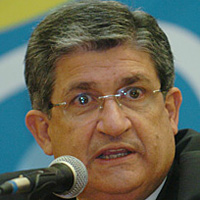
|
Left: Session Chair Ricardo Sánchez Sosa, Director of the UNEP Regional
Office for Latin America and the Caribbean, highlighted the
controversies surrounding dams, and called for balanced actions in
pursuit of sustainable development.
Right: Jerson Kelman,
President, Brazilian National Electric Energy Agency,
stressed the potential benefits of dams to developing countries,
calling for integrative licensing, adequate compensation of local
communities, and strategic planning to ensure environmental sustainability.
|
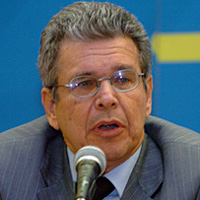
|
|
Business, Water and Sustainable Development
|
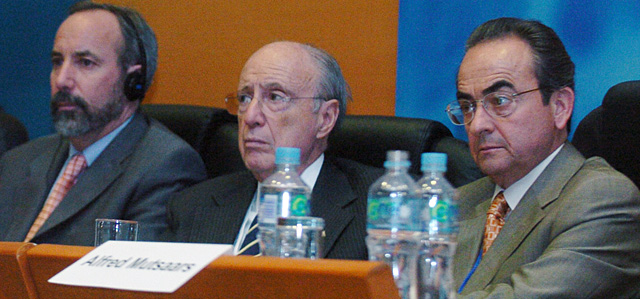
Participants in the session heard case studies on projects in water
purification and wastewater treatment, and information on the role of
banks and local government in supporting water services.
|
|
Participation of the Mayors
|

|

Luis Armando Reynoso Femat, Governor of Aguascalientes, presented two
projects undertaken in his State to address water supply and management:
the "Clear Water" strategic project, which resulted in a saving
of 50 million cubic meters of water per year through modernized
irrigation; and the integral rescue and sanitation of the San Pedro
river, including through the installation of four water treatment
plants. He stressed coordination amongst all levels of government and
local participation across different sectors of society.
|

Ney González Sánchez, governor of Nayarit, spoke on water
and hydroelectricity, presenting El Cajó and La Yesca projects. He
emphasized that water is a common good belonging to the country that
needs to be managed in close collaboration between different levels of
government with a comprehensive outlook for the benefit of local
development. He called for international funding to states and
municipalities for infrastructural development and supplementary
actions, such as sustainable forestry and watershed management.
|
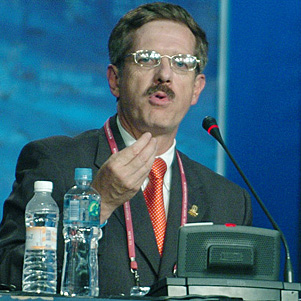
Juan Carlos Romero Hicks, Governor of Guanajuato, outlined various
projects in his state, highlighting a programme for the treatment of
waste water in coordination with townships and municipalities, which
included the construction of 55 collectors and has resulted in 12 new
water treatment plants. He emphasized states' role in linking
different levels of government, and underscored the importance of
decentralization and of working with able and willing municipalities.
|
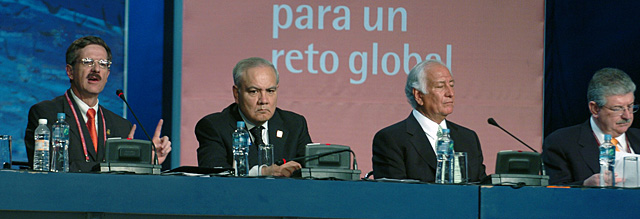
|
|
Around the Forum
|
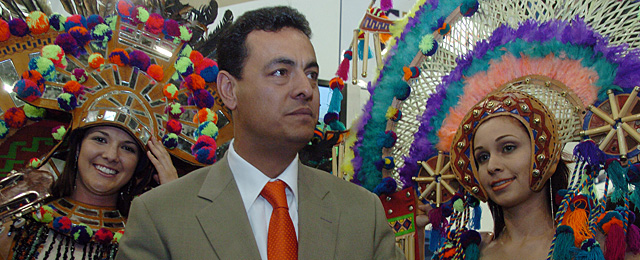
Ismael Hernández, governor of Durango, was flanked by two constituents
in traditional costumes.
|
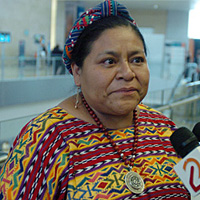
1992 Nobel Peace Prize Winner Rigoberta Menchú Tum, Guatemala, fielded
questions from the press.
|
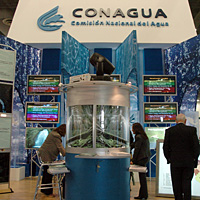
The National Water Commission (CONAGUA) booth in the Water Fair.
|
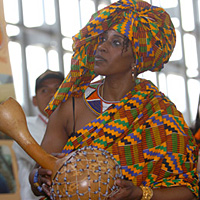
Participants were treated to African drumming and dance throughout the day.
|